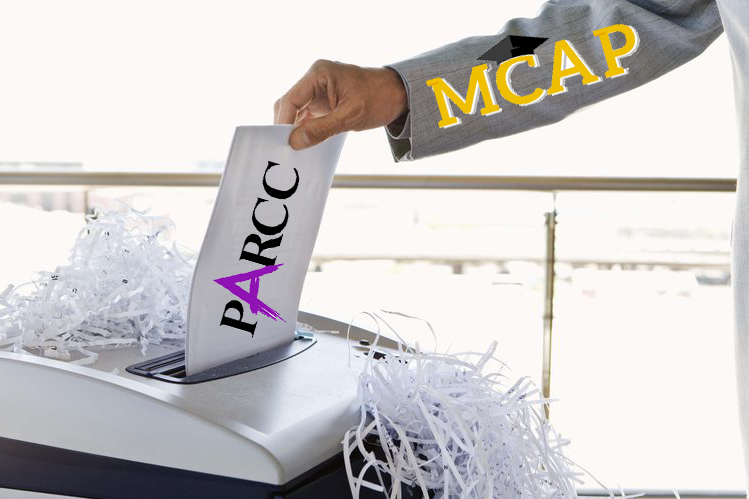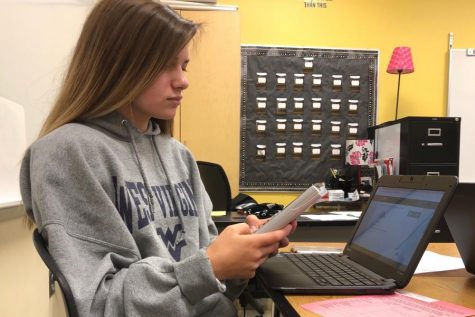Maryland plans to replace PARCC with new standardized test
October 18, 2018
The Partnership for Assessment of Readiness for College and Careers—or PARCC test, as it is more commonly known—is being scrapped in Maryland. This online standardized test is familiar to most Maryland high school students, as it must be taken by students in English 10 and Algebra I (and, for the unfortunate few, Algebra II as well).
For most students, preparation for PARCC is part of most required courses. However, times are changing. Maryland now plans to toss the PARCC in favor of a new standardized test, the MCAP.
According to Jamie Aliveto, the Director of System Accountability and School Improvement for FCPS, the PARCC is being replaced because the Maryland Board of Education wants to create an assessment that “takes less time to administer and that provides more immediate results for students, teachers, and parents.”
Aliveto says that the MCAP (Maryland Comprehensive Assessment Program) may be administered as soon as next year, though the timeline is still tentative.
A few years ago, the first PARCC tests took as many as three days to administer. Now, each is just one class period long, but, students still spend many class periods preparing.
Junior Elizabeth Gilmore said, “I took two PARCC tests last year, and they stressed me out more than needed. I thought some of the questions were irrelevant and didn’t represent the courses.”
Gilmore also said that PARCC was unnecessary because “It judges the teachers’ abilities more than the students’. If the teacher is poor at their job, the students won’t perform well on the test.”
Though this is a valid argument, it is often the function of standardized tests such as the PARCC to measure the success of schools and counties over time more than the capacity of individual students.
Aliveto said, “The state board has insisted that this new assessment must equate to the PARCC assessment in its scoring such that we can continue to measure trends and growth over time.” Therefore, the MCAP will also allow for the observation of trends so educational methods can be improved.
Teachers compose the group that is perhaps the most affected by changes in standardized testing.
Math teacher Jennifer Weiss said that she is against most standardized testing because “It’s hard to get a full understanding of what a student truly knows based on one test.” However, she does say that the PARCC test gives her a guideline of subjects to cover in class. She also says that she often takes the topics she must cover for the test and teaches them in more detail to “let the students see that there is a connection past Algebra 1 and PARCC.”
English teacher Mary Ellen Newcomb said that she is “not a fan of the sheer volume of standardized testing happening right now,” but she does believe that educational standards and college and career readiness are of utmost importance.
She said that PARCC tests, as well as state benchmarks, create deadlines for the course material she is required to teach. “I have quite a number of ‘fun’ activities or projects that I can’t use anymore or that I have had to revise to fit within the current limits,” said Newcomb.
However, she did say that the PARCC has helped her improve her teaching. She said, “It made me look at standards more closely, and it has most definitely led me to consolidate skills in ways I hadn’t thought of before.”
According to Lisa Mathews, the Linganore PTSA president, the current PARCC test targets standards in math and English, and this is something that the MCAP should reflect. However, she does believe that aspects of the PARCC can and should be changed.
“The old test was quite lengthy and posed a challenge for some economically disadvantaged school districts that lacked some of the requisite availability of computers,” said Mathews.
Furthermore, she said, “This change, coupled with the move to the Schoology platform, is a lot to ask of both our educators and our students in a relatively short period, but I believe they are all up to the challenge.”
Mathews has expressed her admiration for the work ethic of Linganore teachers, and believes that the replacement of the PARCC may be difficult, but is worth pursuing.
Linganore has historically earned high PARCC scores in comparison to the rest of Frederick County and Maryland. For example, in 2018, Linganore had an average of 84.6% of students pass the test. While there are many complaints about the PARCC, a new test may not guarantee that these high scores continue.
Social studies teacher Darren Hornbeck is a representative on the Professional Standards and Teacher Education Board. He said that he, too, is concerned about the multitude of new initiatives being introduced in Maryland, and about the switch to the MCAP in particular.
Hornbeck said that the replacement of the PARCC “presents a lot of challenges for teachers who will be forced to adapt.” He also said that people may be concerned about the current costs of administering the PARCC, but that the large development costs for a new test must also be taken into consideration.
Hornbeck said that the MCAP should ideally be less time-consuming than the PARCC, so it doesn’t take up as much school time. He also said that the number of standardized tests students have to take, including the PARCC, benchmarks, and other such assessments, should be reduced.
The final wish that Hornbeck expressed was that Maryland teachers should be involved in the creation of this test. Whether by writing the test or simply acting as advisors, the people who will build their lesson plans around this assessment should play a role in its development.
Maryland students also have opinions about what the MCAP should look like. Gilmore said that she is not happy with the current PARCC test and agrees that it should be replaced, though not, she believes, with another standardized test. However, she said that, as a new test is already being created, “The new PARCC should take less time, but that’s a hard request to satisfy.”
As for the teachers, Weiss said, “There will always be another test to replace the test,” so she is largely indifferent to the change. However, she says that she hopes that knowledge of statistics will no longer be required for the Algebra I test.
Newcomb said that she doesn’t know much about the MCAP, so she can’t yet say with certainty how she feels about the replacement of PARCC. However, she did say that the one thing she would like the MCAP to include would be grammar.
Though the new test is still taking shape, Aliveto said, “It is the state board’s desire to have a computer adaptive assessment that will measure the standards in an equally rigorous manner as PARCC, but that takes less time.” The “computer adaptive” aspect of the MCAP means that the test will change its level of difficulty according to student responses in order to get the most accurate understanding of a student’s proficiency.
Computer adaptivity, according to Mathews, “is similar to what many students will experience in their future working lives when seeking professional certifications in their chosen careers or looking to move on to postgraduate education.” She listed nursing certifications, project management certifications, and the Graduate Management Admission Test (GMAT) as examples of this type of assessment.
Though the switch to the MCAP is a formidable transition to make, it would appear that most Maryland residents are pushing for the change. Taking the time to learn about these changes and new initiatives will make them appear less intimidating once they arrive. Mathews said that she has been advised that there will be meetings in the future that will provide information about the MCAP. She said, “So long as parents attend the meetings and ensure they are informed so that they know what is expected of their children, it is likely the transition can go smoothly.”












